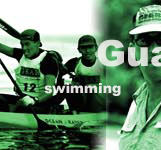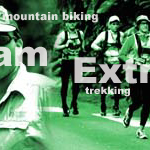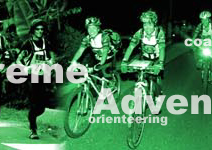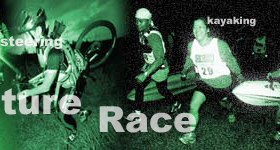G E A R 5
- G U A M, U. S. A.
ニュースレター(2005.5.12) レーススタートが近づいてきました。
各チームはレースのある側面に注意を払ってください。
トレーニングでは、この面がおろそかになりがちです。
我々は, すべてのチームは熱による疲労, 脱水症状、ファースエイドなどに伴われる危険について認識していて欲しいと思います。
チームは深い裂傷, 深手, 頭部の傷などのための救急処理を施せるようにしておくべきです。
万一の時、レスキュー手配と医療処置を、タイムリーに行うことが、レース運営側にとって最も困難なことであるからです。
このレースのあるセクションは日が落ちてからになります。
非常時の場合、夜を乗り越える方法に焦点を合わせてください。
特にトレッキングセクションでは暗闇であなたを見つけられるように。
バイクコースは旗と反射テープで間隔をあけてマークが設置されます。
すべてのチームが, このマークをはっきり認識できるように、バイクのライトを必ず装備してください。レースの一部の区間にある高速道路での走行では、点滅する安全ライトを推奨します。
オープンオーシャンカヤックでは、オーガナイザーが提供するカヤックと同じメーカー・モデルであれば、チームは自分達で用意したパドルを使用しても結構です。
このレースに用いられるものは2人のりシットトップカヤックです。
ディープウォーターでのカヤックの水の浸入と排出の練習はレースのトラブル時に役立つでしょう。位置関係が記載された地図はレースマネージメントからサポートクルーに与えられます。
チェックポイントは見つけやすく、十分な広さがあります。
レース期間中に、選手またはサポートクルーがごみを捨てた場合、そのチームは失格となりレース終了となります。
バイクセクションでは、交通量の多い道路を渡らなければならない場合、チームは,事故を避けるために、バイクを降りて歩いて道路を渡ってください。
ルート沿いで犬に遭遇した場合、 グアムでのレースのもう一つの危険としてこれに注意を向け, できれば, 対立を避けてください。多くの場合、犬のほうが人間を怖がるものです・・・。
あるチェックポイントは, 無人です。そこでは チームが次のチェックポイントで報告する言葉の数を記録してください。その言葉を覚えるためにペンと紙が必要なら、自分達で用意してください。
ナビゲータが一般にこのインフォメーションを担当すると思いますがチームのキャプテンも同様に注意を払ってください。ナビゲータは5月13日金曜日に時間をかけて
14日の夜のナビゲーション手段となるコンパスを準備してください。
レースにはコンパスが必要なチャレンジのセクションがあります。
しかし、あらかじめ用意をするならば, それは簡単なことでしょう。
オリエンテーリングのときに, 研究してください・・・
ナビゲーターはレースの前に潮, 日の出, 日没, および他の天候データをチェックし、その情報をベースにして戦略を立ててください。
グアムの気候への対抗策として、チームは, 15分おきに水分補給、30分おきに栄養補給することをメンバーに促す担当者を決めてください。
先日の日曜日は風もなく、相当に気温が上がる状況でした。GEARが行われた過去4年間をみると、雨が降ったのは4時間に満たなかった・・・。
注意してください!
レースではフィンが必要です。
ウエイトの問題は重要であるが, フィンを使用することも重要である.
質問があれば問合せしてください。
よろしく。
ジェームス・エルキー
レースディレクター
----------------------------------------------(以下原文)------------------------------------------
Hafa Adai
> > Please note the following:
> > As we are fast approaching the race start - we would
like teams to focus
> upon certain aspects of the race that need your teams attention.
> > Training at this point is coming to your taper phase
and the race is
> here for all intents and purposes. We would like all teams
to be
> cognizant of the dangers involved with heat exhaustion,
dehydration,
> etc. for first aid concerns. Teams should be able to complete
first
> aid for deep cuts, gashes, head wounds, etc. as these are
the hardest
> for us to deliver rescue and medical attention in a timely
manner. As
> a section of this race is under the shroud of darkness -
please focus
> on how to get through the night in the case of emergency
as it will be
> difficult to impossible to find you in the dark especially
in the
> trekking sections.
> > The bike course shall be marked by flagging and reflective
tape at
> intervals. All teams will be required to have bike lights
as this will
> prove crutial at points during the race. Blinking safety
lights are
> recommended as road travel on the highway will be required
during some
> portions of the event.
> > Open ocean kayaking should not prove to difficult and
teams are allowed
> to provide thier own paddles for the kayak. They may also
provide
> their own kayaks - as long as they are the same make and
model as the
> ones we are providing. These would be ocean kayak sit-atops
- two man.
> Practicing at ingress and egress from the kayak in deep
water would
> prove helpful as this will occur during the race.
> > Support crews shall be given maps of the locations
that they are to be
> located at by race management. The checkpoints are easy
to find and
> should be large enough to provide space for all concerned.
If any
> trash is left by any racer or support crew at any point
during the day,
> the team that is responsible shall be disqualified and pulled
from the
> race.
> > During the bike portion, if traffic is present at an
area where the road
> must be crossed - teams shall dismount and walk the bikes
across the
> road to eliminate the possibility of being hit darting through
heavy
> traffic. Dogs will be encountered along the route, pay attention
to
> this as another hazard of racing on Guam and avoid confrontation
if
> possible. Most are really more scared of you, than you are
of them...
> > Certain checkpoints will be unmanned and require teams
to record a
> number of a word that is to be reported to the next checkpoint.
If you
> require pen and paper to remember this, you should have
them on your
> person. Navigators are generally in charge of this info,
although team
> captains should also be aware of it as well.
> > Navigators should take time on Friday, May 13th to
not the position of
> stars and their relationship to the compass as they may
be your only
> source of navigation on the evening of the 14th. There is
a portion of
> the event that will challenge the best of you with a compass;
however,
> it should be easy if prepared for in advance...Study up
on your
> orienteering...
> > Navigators should check tides, sunrise, sunset, and
other climatic data
> prior to the race and know what their strategy will be based
upon this
> information.
> > Teams should designate one person to remind the squad
to drink every
> fifteen minutes, eat every thirty, etc. so that you can
hold off the
> effects of the climate on Guam. This past Sunday was blistering
hot
> and brutal with no wind. It has rained less than four hours
in the
> four years of GEAR thus far...for some reason the day turns
out
> beautiful and hot that day...be careful!
> > Fins are required during portions of the event. Weight
is a factor, but
> so is their use.
> > Questions?? Fire away....
> > > Si Yu'us Masse,
> James Oelke
> Race Director
|







